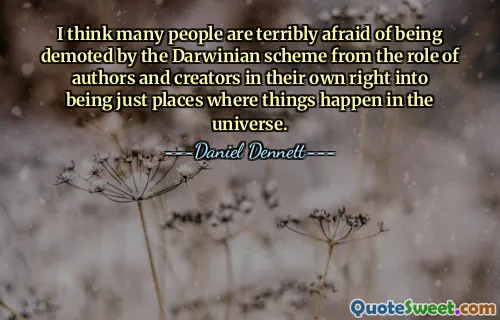Daniel Dennett is a prominent philosopher and cognitive scientist renowned for his work on consciousness, evolution, and the philosophy of mind. His ideas have significantly influenced discussions on how we understand consciousness and its origins. Dennett advocates for a scientific approach to the study of the mind, suggesting that consciousness can be analyzed similarly to other biological phenomena through evolutionary theory. Throughout his career, Dennett has published several influential books, including "Consciousness Explained," where he explores the mechanics of conscious experience. He often argues against dualistic views of the mind and body, proposing instead a model that emphasizes the brain's role in generating conscious thoughts. As a public intellectual, Dennett actively engages with both academic and general audiences, making complex philosophical concepts accessible. His arguments often challenge traditional notions of free will and self, urging a reevaluation of how we define human identity and agency in light of scientific discoveries.
Daniel Dennett is a distinguished philosopher and cognitive scientist known for his profound contributions to the philosophy of mind and consciousness. His academic work bridges the gap between philosophy and the sciences, focusing on how evolutionary processes shape our understanding of the mind.
One of Dennett's most notable works, "Consciousness Explained," presents a detailed analysis of conscious experience, emphasizing a scientific approach rather than metaphysical speculation. He advocates for a view of consciousness that integrates both neural mechanisms and evolutionary perspectives.
As a public thinker, Dennett engages with a broad audience, simplifying complex philosophical ideas and encouraging discussions about free will, identity, and morality. His ability to communicate effectively has made him a pivotal figure in contemporary philosophy, fostering a deeper understanding of human thought and behavior.
More »
Today Birthdays
1955 -
Max Lucado
1946 -
John Piper
1842 -
William James
1907 -
Abraham Joshua Heschel
1887 -
Aldo Leopold
1755 -
Alexander Hamilton
1976 -
Alethea Kontis
1971 -
Mary J. Blige
1825 -
Bayard Taylor
1943 -
Jim Hightower
1885 -
Alice Paul
1923 -
Carroll Shelby
1928 -
David L. Wolper
1954 -
Kailash Satyarthi
1972 -
Amanda Peet
1946 -
Naomi Judd
1970 -
Malcolm D. Lee
1955 -
Christian Marclay
1973 -
Rahul Dravid
1987 -
Jamie Vardy
1942 -
Clarence Clemons
1992 -
Fatima Sana Shaikh
1948 -
Larry Harvey
1930 -
Rod Taylor
